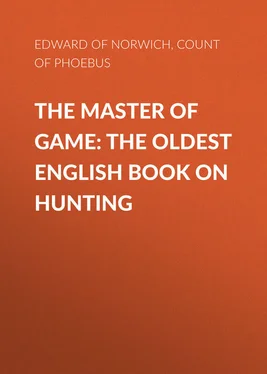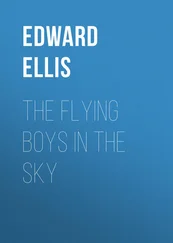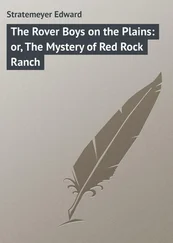Edward Array - The Master of Game - The Oldest English Book on Hunting
Здесь есть возможность читать онлайн «Edward Array - The Master of Game - The Oldest English Book on Hunting» — ознакомительный отрывок электронной книги совершенно бесплатно, а после прочтения отрывка купить полную версию. В некоторых случаях можно слушать аудио, скачать через торрент в формате fb2 и присутствует краткое содержание. Жанр: Хобби и ремесла, foreign_antique, foreign_prose, на английском языке. Описание произведения, (предисловие) а так же отзывы посетителей доступны на портале библиотеки ЛибКат.
- Название:The Master of Game: The Oldest English Book on Hunting
- Автор:
- Жанр:
- Год:неизвестен
- ISBN:нет данных
- Рейтинг книги:5 / 5. Голосов: 1
-
Избранное:Добавить в избранное
- Отзывы:
-
Ваша оценка:
- 100
- 1
- 2
- 3
- 4
- 5
The Master of Game: The Oldest English Book on Hunting: краткое содержание, описание и аннотация
Предлагаем к чтению аннотацию, описание, краткое содержание или предисловие (зависит от того, что написал сам автор книги «The Master of Game: The Oldest English Book on Hunting»). Если вы не нашли необходимую информацию о книге — напишите в комментариях, мы постараемся отыскать её.
The Master of Game: The Oldest English Book on Hunting — читать онлайн ознакомительный отрывок
Ниже представлен текст книги, разбитый по страницам. Система сохранения места последней прочитанной страницы, позволяет с удобством читать онлайн бесплатно книгу «The Master of Game: The Oldest English Book on Hunting», без необходимости каждый раз заново искать на чём Вы остановились. Поставьте закладку, и сможете в любой момент перейти на страницу, на которой закончили чтение.
Интервал:
Закладка:
CHAPTER III
OF THE HART AND HIS NATURE
The hart is a common beast enough and therefore me needeth not to tell of his making, for there be few folk that have not seen some. The harts be the lightest (swiftest) beasts and strongest, and of marvellous great cunning. They are in their love, which men call rut, about the time of the Holy Rood 28 28 September 14. See Appendix: Hart, Seasons.
in September and remain in their hot love a whole month and ere they be fully out thereof they abide (in rut) nigh two months. And then they are bold, and run upon men as a wild boar would do if he were hunted. And they be wonderfully perilous beasts, for with great pain shall a man recover that is hurt by a hart, and therefore men say in old saws: "after the boar the leech and after the hart the bier." For he smiteth as the stroke of the springole, 29 29 An engine of war used for throwing stones.
for he has great strength in the head and the body. They slay, fight and hurt each other, when they be in rut, that is to say in their love, and they sing in their language that in England hunters call bellowing as man that loveth paramour. 30 30 G. de F., p. 12. "Ainsi que fet un homme bien amoureus" ("As does a man much in love)."
They slay hounds and horses and men at that time and turn to the abbay (be at bay) as a boar does especially when they be weary. And yet have men seen at the parting of their ligging (as they start from the lair) 31 31 This word ligging is still in use in Yorkshire, meaning lair, or bed, or resting-place. In Devonshire it is spelt "layer." Fortescue, p. 132.
that he hath hurt him that followeth after, and also the greyhounds 32 32 G. de F., p. 12, has "limer" instead of "greyhound."
and furthermore a courser. And yet when they are in rut, which is to say their love, in a forest where there be few hinds and many harts or male deer, they slay, hurt and fight with each other, for each would be master of the hinds. And commonly the greatest hart and the most strong holdeth the rut and is master thereof. And when he is well pured and hath been long at rut all the other harts that he hath chased and flemed away (put to flight) from the rut then run upon him and slay him, and that is sooth. And in parks this may be proved, for there is never a season but the greatest hart will be slain by the others not while he is at the rut, but when he has withdrawn and is poor of love. In the woods they do not so often slay each other as they do in the plain country. And also there are divers ruts in the forest, but in the parks there are none but that are within the park. 33 33 This passage is confused. In G. de F., p. 12, we find that the passage runs: "Et aussi il y a ruyt en divers lieux de la forest et on paix ne peut estre en nul lieu, fors que dedans le part." Lavallée translates these last five words, "C'est à dire qu'il n'y a de paix que lorsque les biches sont pleines." In the exceedingly faulty first edition by Verard, the word "part" is printed " parc ," as it is in our MS.
After that they be withdrawn from the hinds they go in herds and in soppes (troops) with the rascal (young lean deer) and abide in (waste) lands and in heathes more than they do in woods, for to enjoy the heat of the sun, they be poor and lean for the travail they have had with the hinds, and for the winter, and the little meat that they find. After that they leave the rascal and gather together with two or three or four harts in soppes till the month of March when they mew (shed) their horns, and commonly some sooner than others, if they be old deer, and some later if they be young deer, or that they have had a hard winter, or that they have been hunted, or that they have been sick, for then they mew their heads and later come to good points. And when they have mewed their heads they take to the strong (thick) bushes as privily as they may, till their heads be grown again, and they come into grease; after that they seek good country for meating (feeding) of corn, of apples, of vines, of tender growing trees, of peas, of beans, and other fruits and grasses whereby they live. And sometimes a great hart hath another fellow that is called his squire, for he is with him and doth as he will. And so they will abide all that season if they be not hindered until the last end of August. And then they begin to look, and to think and to bolne and to bellow and to stir from the haunt in which they have (been) all the season, for to go seek the hinds. They recover their horns and are summed of their tines as many as they shall have all the year between March when they mewed them to the middle of June; and then be they recovered of their new hair that men call polished and their horns be recovered with a soft hair that hunters call velvet at the beginning, and under that skin and that hair the horn waxes hard and sharp, and about Mary Magdalene day (July 22) they fray their horns against the trees, and have (rubbed) away that skin from their horns and then wax they hard and strong, and then they go to burnish and make them sharp in the colliers places (charcoal pits) that men make sometimes in the great groves. And if they can find none they go against the corners of rocks or to crabbe tree or to hawthorn or other trees . 34 34 G. de F., p. 14, says the harts go to gravel-pits and bogs to fray.
They be half in grease or thereabouts by the middle of June when their head is summed, and they be highest in grease during all August. Commonly they be calved in May, and the hind beareth her calf nine months or thereabout as a sow, 35 35 The MS. transcriber's mistake. It should be "cow."
and sometimes she has three 36 36 G. de F. has "2 calves" as it should be.
calves at a calving time. And I say not that they do not calve sometime sooner and sometime later, much according to causes and reasons. The calves are calved with hair red and white, which lasteth them that colour into the end of August, and then they turn red of hair, as the hart and the hind. And at that time they run so fast that a hare 37 37 G. de F. has "greyhound," as it should be (p. 15): "Et dès lors vont ils jà si tost que un levrier a assés à fere de l'ateindre, ainsi comme un trait d'arcbaleste" ("And from that time they go so quickly that a greyhound has as much to do to catch him as he would the bolt from a crossbow)."
should have enough to do to overtake him within the shot of an haronblast (cross-bow). Many men judge the deer of many colours of hair and especially of three colours. Some be called brown, some dun and some yellow haired. And also their heads be of divers manners, the one is called a head well-grown, and the other is called well affeted, 38 38 Well proportioned. See Appendix: Antler.
and well affeted is when the head has waxed by ordinance according to the neck and shape, when the tines be well grown in the beam by good measure, one near the other, then it is called well affeted. Well grown is when the head is of great beam and is well affeted and thick tined, well high and well opened (spread). That other head is called counterfeit (abnormal) when it is different and is otherwise turned behind or wayward in other manner than other common deer be accustomed to bear. That other high head is open, evil affeted with long tines and few. That other is low and great and well affeted with small tines. And the first tine that is next the head is called antler, and the second Royal and the third above, the Sur-royal, and the tines 39 39 Shirley MS. has the addition here: "Which be on top."
which be called fourth if they be two, and if they be three or four or more be called troching. And when their heads be burnished at the colliers' pits commonly they be always black, and also commonly when they be burnished at the colliers' pits they be black on account of the earth which is black of its kind. And when they are burnished against rock they abide all white, but some have their heads naturally white and some black. And when they be about to burnish they smite the ground with their feet and welter like a horse. And then they burnish their heads, and when they be burnished which they do all the month of July they abide in that manner till the feast of the Holy (Cross) in September 14th and then they go to rut as I have said.
Интервал:
Закладка:
Похожие книги на «The Master of Game: The Oldest English Book on Hunting»
Представляем Вашему вниманию похожие книги на «The Master of Game: The Oldest English Book on Hunting» списком для выбора. Мы отобрали схожую по названию и смыслу литературу в надежде предоставить читателям больше вариантов отыскать новые, интересные, ещё непрочитанные произведения.
Обсуждение, отзывы о книге «The Master of Game: The Oldest English Book on Hunting» и просто собственные мнения читателей. Оставьте ваши комментарии, напишите, что Вы думаете о произведении, его смысле или главных героях. Укажите что конкретно понравилось, а что нет, и почему Вы так считаете.












